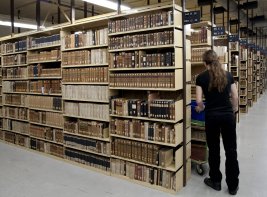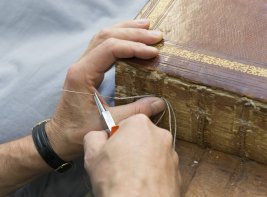Through the Bibliotheek en Basisvaardigheden (Library and Basic Skills) programme, we support libraries in setting up their services for vulnerable demographic groups. These are people who have difficulties with reading, writing, speaking, doing maths and using the internet. The programme can help them participate more fully in everyday society. The activities aimed at functional illiteracy are diverse, and are often organised in the (Digi)taalhuis, a place in the library where people can work on these skills. It is not necessary to be a library member: everyone is welcome.
Improving your reading, writing, speaking, maths and internet skills in the library's (Digi)taalhuis
How do public libraries help people who have difficulties with reading, writing, speaking, maths, Dutch or using the internet get along in society? And what role does the KB play in that?
Through the Bibliotheek en Basisvaardigheden (Library and Basic Skills) programme, the KB helps libraries establish services for some 2,5 million vulnerable people (who speak Dutch as a first or second language, NT1 and NT2) who have difficulties with reading, writing, speaking, maths, Dutch or using the internet. The services are provided in the (Digi)taalhuis and cover all subjects that require basic skills. For example, libraries provide language lessons and language or internet cafés, but they also help people find work, fill out forms, obtain legal advice and improve their health literacy.
The KB supports these libraries in various ways, such as the national-level purchase of courses, expertise development for library staff, and research and marketing.
Why was the Bibliotheek en Basisvaardigheden programme established?
The Bibliotheek en Basisvaardigheden programme contributes to an inclusive society in which everyone can participate.
As such, the Library and Basic Skills programme fits well with the ongoing development of a broad community library and is explicitly mentioned in the Bibliotheekconvenant 2020-2023. This agreement was concluded on 30 September 2020, with the parties VNG, IPO, OCW, VOB, KB and SPN committing to the objectives of the programme.
What has the Bibliotheek en Basisvaardigheden programme achieved so far?
- More than 336 libraries have a (Digi)taalhuis hosting activities aimed at language and digital skills.
- Furthermore, 93 percent of libraries in the Netherlands host activities to help NT1 learners improve their reading, writing and speaking skills, and 99 percent of libraries organise activities to help NT2 learners improve their proficiency in the Dutch language.
- In 97 percent of libraries, services are provided to help people improve their computer skills.
- 30 to 80 percent of libraries offer services around various subjects (work, health, family, legal) that require language and digital skills.
KB experts on functional illiteracy and basic skills
- Stephanie Kuijper – Assignment manager basic skills
- Team basic skills, consisting of Stephanie Kuijper, Lisenka Akse and Karin Ottenhoff, mail: [email protected]



